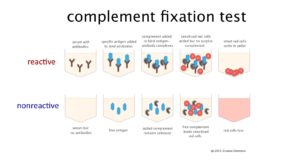 A diagnostic test for serum (the fluid, non-cellular part of blood) antibodies to MAP, produced in response to infection. The technique, also used for diagnosis of other infectious diseases, requires that the antibodies bind to antigens and then bind (fix) complement. An indicator system, involving red blood cells pre-coated with anti-red blood cell antibody, allows interpretation of whether complement was fixed thus indirectly indicating that antibody to MAP was present in the test serum sample. By testing serial dilutions of each serum sample to be tested it is possible to gauge how much antibody to MAP is present in the test sample. Results are reported as the highest serum dilution not “fixing” complement. This assay is not internationally standardized. Each laboratory or country uses its own MAP antigen formulation. In addition, other reagents are needed that must be prepared fresh (notably antibody coated red blood cells) with each new batch of assays. Criteria for interpretation of the CF test for paratuberculosis also may vary between countries. There is a move internationally toward replacing the CF test with ELISA as the basis for testing animals for international trade because ELISA can be better standardized and hence more reproducible between countries. For more information on paratuberculosis testing for international trade the visitor should refer to the OIE Manual of Standards for Diagnostic Tests & Vaccines.
A diagnostic test for serum (the fluid, non-cellular part of blood) antibodies to MAP, produced in response to infection. The technique, also used for diagnosis of other infectious diseases, requires that the antibodies bind to antigens and then bind (fix) complement. An indicator system, involving red blood cells pre-coated with anti-red blood cell antibody, allows interpretation of whether complement was fixed thus indirectly indicating that antibody to MAP was present in the test serum sample. By testing serial dilutions of each serum sample to be tested it is possible to gauge how much antibody to MAP is present in the test sample. Results are reported as the highest serum dilution not “fixing” complement. This assay is not internationally standardized. Each laboratory or country uses its own MAP antigen formulation. In addition, other reagents are needed that must be prepared fresh (notably antibody coated red blood cells) with each new batch of assays. Criteria for interpretation of the CF test for paratuberculosis also may vary between countries. There is a move internationally toward replacing the CF test with ELISA as the basis for testing animals for international trade because ELISA can be better standardized and hence more reproducible between countries. For more information on paratuberculosis testing for international trade the visitor should refer to the OIE Manual of Standards for Diagnostic Tests & Vaccines.